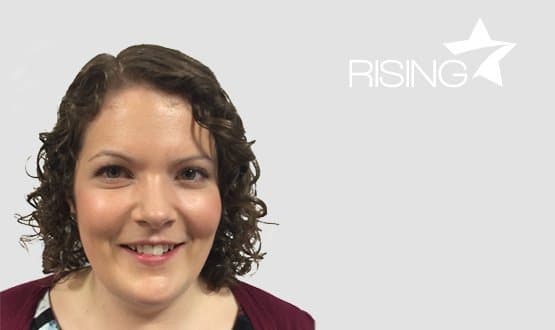Rising star: Madeleine Neve
- 17 April 2014

In between sorting out place cards and flower arrangements for her upcoming wedding, Salford Royal NHS Foundation Trust’s head of IM&T strategy Madeleine Neve has found time to lead the trust’s electronic patient record implementation.
The trust implemented Allscripts Sunrise Clinical Manager last June, three months ahead of its original schedule, which Neve puts down to the hard work the trust put in with the company.
She says she waited two years for the day that the system went live, and was thrilled when it finally happened.
“The EPR go-live was two years in the making. I was floor walking through the wards at midnight on the day we went live; skipping down the corridor very excited that we’d done it,” she says.
Graduate training scheme success
Neve never studied IT at university, but always knew she wanted to work in the NHS. “I studied IT at A-level but had a class full of boys and decided I didn’t want to go down that road,” she said.
Instead she opted for biomedical science at the University of Manchester. After graduation, though, she was unsure of what to do next and got a job as a healthcare assistant.
“I really enjoyed that, but I felt it wasn’t the role for me,” she says. She then went on to work at the Christie NHS Foundation Trust as an assistant to the head of clinical systems, where she got her first taste of working with IT systems.
It was while she was at the Christie that she decided to apply for the health informatics management strand of the NHS Graduate Management Training Scheme, which was then in its first year.
After what she describes as a year of assessment centres and tests, she was accepted onto the scheme and went on to gain an MSc in health informatics.
Her first placement was at NHS Bolton – then a primary care trust – where she worked as an information analyst. She followed that with a stint at private information provider Dr Foster.
“I did an analysis placement, and put together the Hospital Guide with them that year,” she says, adding that it was a “very interesting experience.”
Her final placement as part of the scheme was at Salford, and it was here she was offered a job after finishing the trainee scheme.
It was originally a temporary project manager role, but a few months in, the trust’s associate IT director, Mark Hutchinson, asked her to stay on and write a specification for the EPR before the trust went out to procurement.
“To cut a long story short, I’ve spent the last couple of years to work on the EPR implementation,” she says.
Balancing strategy and operational work
Her role as head of IM&T strategy was created specifically for her and involves most aspects of the trust’s clinical systems and strategy.
“My role is to articulate the benefits and capabilities of informatics. Part of that is developing a strategy for how we are going to deliver those benefits, says Neve.
“In terms of the vision of EPR, now that we are live with [Allscripts], it is about harnessing the capability of the system and the potential it has to enhance care.”
The next steps are to go live with the Allscripts patient flow system, to put in new functionality for critical care, and to integrate mobile devices. Neve says that “it will be an exciting few months.”
The trust also received more than £700,000 from the Nursing Technology Fund for a vital signs project, which is another project to put on Neve’s list.
However, her role also involves “sorting out other bits” that need addressing right away. “To balance strategy and operational work is a challenge,” she acknowledges.
There’s a lot of stuff that involves looking at things and how that will impact the organisation in five or ten years’ time, but then we also need short term plans and changes that we can benefit from right away.
“You feel a bit like you’re pulled in two different directions sometimes but the bits that stretch me are always quite enjoyable.”
One of the favourite parts of her job is talking to people and she enjoys educating and sharing with people what informatics can do.
“[Informatics] has previously been seen as this ‘back office’ function. I describe the capabilities that the system offers, and create a relationship role for informatics,” she says. “It’s easy to sit in an office far away from clinical care, but it’s important to remember why we do what we do.”
Big ticks
Neve’s average day begins at 7.30 am with an hour of email. That is usually followed by meetings of different kinds such as with trust executives and programme boards and working on delivering the IT strategy.
One of her favourite bits though, she says, is “going out and about meeting people in the service and having talks about their requirements.”
Twelve hours later, at 7.30pm, her day normally finishes. With hours like that, she admits that fitting in time to plan her July wedding is challenging, but that her project managing skills are being put to the test.
“I haven’t applied any PRINCE2 methodology to my wedding so far though,” she laughs.
“One of the benefits of my job is that I got used to knowing that things take time,” she adds, referring to the fact that as she has developed within her role, she has had to get used to not being able to tick off her to do list at the end of the day.
“You can do a project for six or nine months before getting to that satisfactory tick,” she says.
Her role has also taught her to enjoy the planning and being pragmatic. She says that although there are probably several hundred florists out there who could supply her flowers, comparing four of them is probably going to be plenty.
“It’s about being sensible and enjoying it. I’m not stressed. Not yet,” she adds, perhaps not a hundred percent convincingly, before she adds: “I keep myself busy.”
| Fact box | |
| Name: | Madeleine “Maddie” Neve |
| Job title: | Head of IM&T strategy |
| Main challenge at work: | Time! There just aren’t enough hours to go around |
| Favourite part of work: | Talking to people |
| Hobbies: | Not time for much else than wedding planning and work. |

The EHI Awards 2014 include a new Rising Star category, designed to highlight the work of health informatics staff under the age of 30 who are achieving excellent results and making an outstanding contribution to healthcare.




